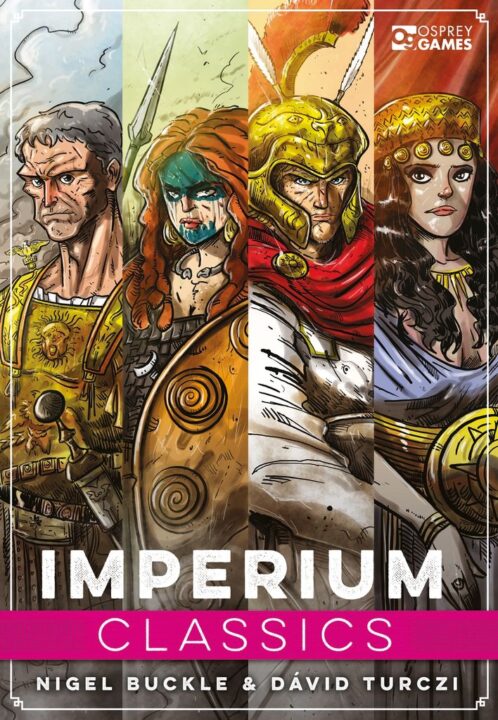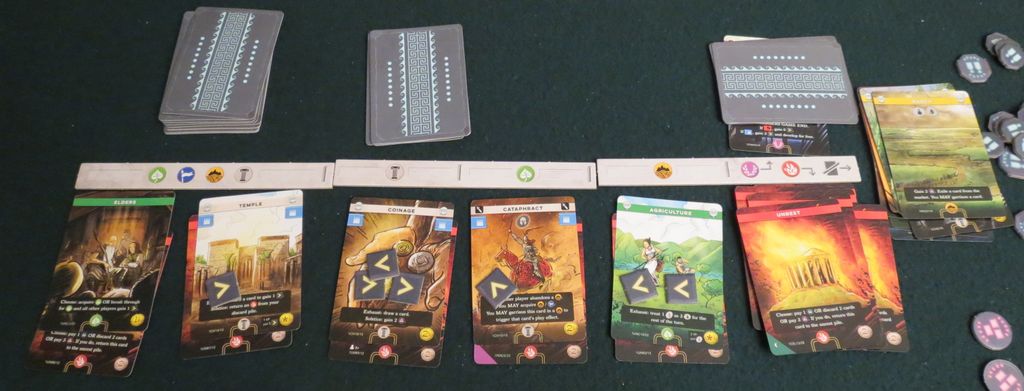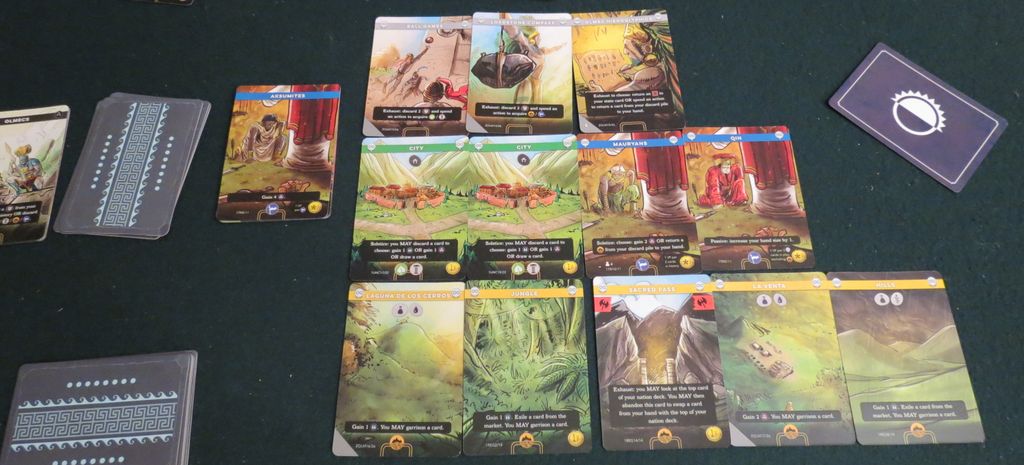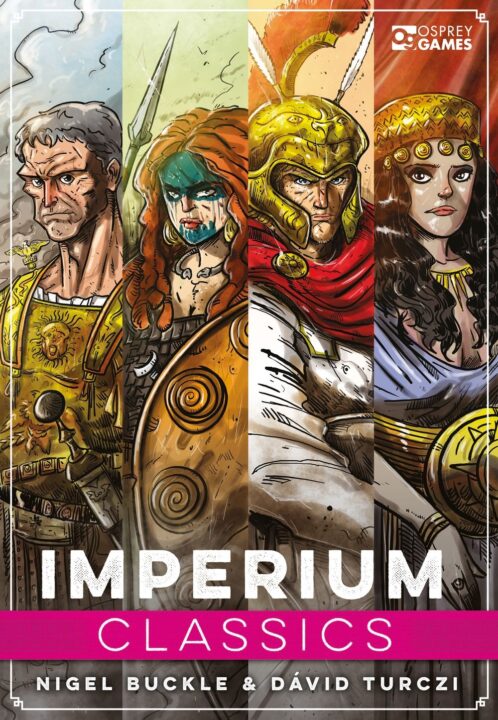Overview
Delving into the ancient and mythical reaches of historical civilizations, ‘Imperium: Classics‘ presents a gaming experience ripe with strategy and social maneuvering. As we buckle up for this review, we’ll explore the nuanced dimensions of Card Management Strategy introduced by this game, witnessing firsthand how these mechanics ebb and flow within the framework of Civilization Progression & Development. And for those who revel in the art of negotiation and alliance-forming, this title promises a foray into Player Interaction & Alliances that could change the tide of power with a single, well-played turn. Let the journey begin!
How It Plays
Setting Up
In Imperium: Classics, each player begins by selecting a unique civilization, laying out their starting deck of cards, and drawing an initial hand. The public tableau is prepared with cards from the common deck and the individual faction decks. Development and unrest cards are also arranged on the table. Crucial tokens and resources are made available to form the supply.
Gameplay
Players take turns activating cards from their hand to gather resources, draw cards, conquer regions, and perform a multitude of civilization-specific actions. Tactics play out in rounds of taking turns, where you build your deck, manage your hand, and face off against both the game and other players. Strategic planning is vital as actions taken resonate throughout a player’s evolution. A careful balance must be struck between expansion and governance to optimize the engine you’re creating.
Winning the Game
Victory in Imperium: Classics is achieved by amassing victory points, which are accumulated through completed wonders, advancement of your empire on the development track, and conquering regions. The game ends once all nations have passed or one civilisation has reached the end of their development track. Calculating each player’s points reveals the dominant civilization and the winner of the game.
Want to know more? Read our extensive strategy guide for Imperium: Classics.
Mastering the Art of Cards
Deck Dynamics
When I first cracked open ‘Imperium: Classics’, the diverse decks immediately seized my attention. Each card appeared as an opportunity, a newfound strategy forming with every draw. During my initial plays, it became clear that managing your deck wasn’t just a part of the game; it was the pulsing heart of your civilization. Indeed, adeptly playing cards to your advantage while jetting out the chaff resembles the cunning maneuvers of a storied general. Consequently, every card decision became a momentous shift, increasing in gravitas towards the game’s climax.
Precise Playmaking
Honing the skill of when to play, when to hold back, and when to shuffle off cards into oblivion was critical — as significant as the Spartans judgment at Thermopylae. With each game of ‘Imperium: Classics’, I found myself not only anticipating my opponents’ strategies but predicting their every move, my choices informed by the ever-expanding tableau before me. The thrill of executing a flawlessly timed play provided spikes of unparalleled excitement, reminiscent of a hawk swooping in for the clenching strike.
Stay tuned, as we lead our discussion towards Civilization Progression & Development, another Empire-size facet of ‘Imperium: Classics’!

The Pillars of Empires
In my plays of Imperium: Classics, witnessing the unique journey of each civilization unfurl is nothing short of remarkable. Evolution is key; whether I steered the nimble Carthaginians or the mighty Romans, each game felt like penning a new chapter in a history book.
Ramping Up Resources
From the get-go, resource management halts any temptation to sprint. Accumulation and investment reflect true strategic depth – crucial in erecting an empire resonant throughout the ages.
Mighty Milestones
Then there are the milestones, moments of accomplishment that are as much about strategic choice as they are testament to progress. When my civilization accomplishes a monument, it’s a tactical victory lap and a narrative arc in one.
Continuing our odyssey of empire-building, the forum soon becomes abuzz – up next, I’ll delve into the intricate dance of Player Interaction & Alliances.

The Dance of Diplomacy in Imperium
My journey with Imperium: Classics has been paved with the ebb and flow of player dynamics. As I navigated the game, the essence of diplomacy shimmered through every session. Crafting temporary alliances and plotting cunning distractions allowed for a captivating dance with rival civilizations.
Maneuvering Through Alliances
The delicate art of alliance is critical in Imperium. In one game, I aligned with a friend, our civilizations complementing one another’s strengths. However, as the epochs marched on, we both knew this was but a temporary truce, bound to be upended by the quest for continued power and dominion. We didn’t just spend afternoons—we wove historical tapestries rife with backdoor deals and fleeting partnerships.
Surprising Turns and Twists
Then came the twists that strictly competitive titles often lack. Another evening a new player, ostensibly far behind, brokered a clever series of trades that reshaped the entire diplomatic landscape. It’s these moments of social sorcery in Imperium that bring to the fore not only the mechanics but the depth of human interaction.
Intertwined with subtle strategy and overt confrontations, Imperium: Classics goes beyond a mere board game—it’s a symphony of alliances, betrayals, and ultimately, friendships solidified around a table of comradery. So, do I recommend this intriguing dance of civilizations? Absolutely and without reservation—endorse it for the alliance crafters, the tacticians, the diplomats.

Conclusion
In closing this review of Imperium: Classics, it’s clear that this game has much to offer strategy enthusiasts and fans of civilization-building themes. From its in-depth card management strategy to the rewarding complexities of civilization progression, coupled with the enticing dance of alliance and rivalry facilitated by its player interaction, there’s a wealth of deeply tactical play. The game asks players to carefully manage their hands and leverage their unique civilization abilities to outmaneuver opponents. The robustness of its mechanics speaks to a game that can offer fresh challenges for many sessions to come. Imperium: Classics is a standout addition to the genre, really showcasing how a well-crafted game can lead to so much more than just a victory—but a compelling narrative wrought through the echoes of history. Conclusively, whether you’re convening with veteran gamers or introducing budding strategists to the genre, Imperium: Classics is a game I wholeheartedly recommend.


